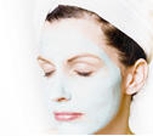
In zootomy and dermatology, skin is an organ of the integumentary system composed of a layer of tissues that protect underlying muscles and organs. As the interface with the surroundings, it plays the most important role in protecting against pathogens. Its other main functions are insulation and temperature regulation, sensation and vitamin D and B synthesis. Mammalian skin often contains hairs, which in sufficient density is called fur. The hair mainly serves to augment the insulation the skin provides, but can also serve as a secondary sexual characteristic or as camouflage. On some animals the skin is very hard and thick, and can be processed to create leather. Reptiles and fish have hard protective scales on their skin for protection, and birds have hard feathers, all made of tough β-keratins. Amphibian skin is not a strong barrier to passage of chemicals. A frog sitting in an anesthetic solution will quickly go to sleep. The skin on a person's face is seen by people that person interacts with. For some people, therefore, facial skin care is of particular importance, and they often use cosmetics to deal with the appearance of the face and condition of the skin, such as those for pore control and black head cleansing. The main cell types of skin are fibroblasts, adipocytes (fat storage) and macrophages. Sebaceous glands are exocrine glands which produce sebum, a mixture of lipids and waxy substances: lubrication, water-proofing, softening and antibactericidal actions are among the many functions of sebum. Sweat glands open up via a duct onto the skin by a pore. The dermis can be split into the papillary and reticular layers. The papillary layer is outermost and extends into the dermis to supply it with vessels. It is composed of loosely arranged fibres. Papillary ridges make up the lines of the hands. The reticular layer is more dense and is continuous with the hypodermis. It contains the bulk of the structures (such as sweat glands). The reticular layer is composed of irregularly arranged fibres and resists stretching. Skin can be dividided into thick and thin types. Thick skin is present on the soles of the feet and the palms of the hands. It has a larger stratum corneum with a higher keratin content. Thick skin does not grow hair; its purpose is to help grip. Thin skin is present on the bulk of the body and has a smaller stratum corneum and fewer papillae ridges. It has hair and is softer and more elastic. The characteristics of the skin, including sensory nerve density and the type of hair, vary with location on the body. The constantly peeling off dead cells of the epidermis mix with the secretions of the sweat and sebaceous glands and the dust found on the skin to form a filthy layer on its surface. If not washed away the dirt and dead skin slurry begins to decompose emitting a foul smell. The skin supports its own ecosystems of microorganisms, including yeasts and bacteria, which cannot be removed by any amount of cleaning. In general these organisms keep one another in check and are part of a healthy skin. When the balance is disturbed, e.g., by antibiotics which kill bacteria, there may be an overgrowth and infection by yeasts. The skin is continuous with the inner epithelial lining of the body at the orifices, each of which supports its own complement of flora.
If you take care of your skin, your skin will take care of you! But with all of the lotions, creams, and potions on the market, it can be difficult to know which product will work for you. Many products claim to remove wrinkles or heal dry skin. Others claim to contain expensive ingredients that they say will improve the effects of the product. The first step to taking care of your skin is preventing damage. Sun, wind, pollutants, and simply aging can degrade the condition of your skin. Common complaints include dry and itchy skin, wrinkles, sagging, color changes, and age spots. There are steps that you can take to keep you skin looking and feeling its best. Exercise, rest, and good nutrition lay the foundation for beautiful, healthy skin, inside and out. A proper diet is not only good for your overall health, it also helps to ensure that your skin will receive all of the vitamins, minerals, and nutrients that it needs to maintain and repair cells. Drinking purified water is another good way to keep your skin healthy. Water helps to hydrate the skin and move waste and nutrients through the system. It is very effective mixing a teaspoon or capful of Organic Apple Cider Vinegar in with your water. Do not drink Tap Water. The most important way to care for your skin is to protect it from the damaging rays of the sun. Ultraviolet radiation damages the skin and can lead to wrinkles, premature aging, age spots, and cancer. Take extra precautions to make sure your skin is not exposed to the sun's rays. Use a natural sunscreen, or a moisturizer that contains sunscreen (at least SPF 15) everyday. Your skin does need some sunlight 10-15 minutes of direct exposure daily. A skin care routine does not have to be elaborate in order to be effective. But you should develop some kind of skin care routine based on your skin type, daily activities, and nutritional needs so that you can be sure you are taking the very best care of your skin. Following a daily skin care regime will also allow you to more closely evaluate your skin for abnormalities. Unless your skin is very oily, you will want to use a moisturizer everyday to keep your skin hydrated and healthy. Your skin needs moisturizer all year long as both the indoor winter heat, and summer sun can be equally damaging to your skin. Apart from the services offered at skin clinics, many creams, gels and ointments that claim to treat acne, diminish sun or age spots and enhance skin elasticity are widely available in the market. There are scrubs, cleansers, masks, over-the-counter skin medicine and skin peel formulations, all offered at various price ranges. Most can be bought at department stores or drugstores, but the fact is that very few of these so- called miracle products actually work. Experts say that the amount of wrinkles that a person will develop through the years also depends on the genetic make up of this individual. However, smoking, sun exposure, dry skin, and repetitive facial expressions and mannerisms such as frowning, can all enhance the creation of wrinkles that may or may not be permanently present.

Definition interpretingAcne
- An inflammatory disease of the sebaceous glands and hair follicles of the skin that is marked by the eruption of pimples or pustules, especially on the face.
Bacteria
- Microscopic unicellular prokaryotic organisms characterized by the lack of a membrane-bound nucleus and membrane-bound organelles.
Dermis
- The sensitive connective tissue layer of the skin located below the epidermis, containing nerve endings, sweat and sebaceous glands, and blood and lymph vessels.
Epidermis
- The outer, protective, nonvascular layer of the skin of vertebrates, covering the dermis.
Hypodermis
- A subcutaneous layer of loose connective tissue containing a varying number of fat cells.
Pimples
- A small swelling of the skin, usually caused by acne; a papule or pustule.
Ultraviolet radiation
- Invisible electromagnetic radiation between visible violet light and X rays.
|